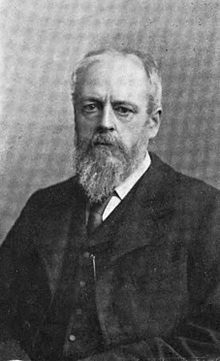Charles Kegan Paul
British publisher and author
Charles Kegan Paul (8 March 1828 – 19 July 1902) was a teacher at Eton, an Anglican vicar, publisher and author.

| This article on an author is a stub. You can help out with Wikiquote by expanding it! |
Quotes
edit- Literature has had little to say of the labourer; and this, not that his class is lacking in interest, in poetry, in romance, but simply because those sections of society to which writers belong know nothing about him.
- (1883). "The Rustic of George Eliot and Thomas Hardy". Merry England 1 (1): 40-51. (quote from p. 40)
Memories (1899)
edit- I read Tennyson for myself, learning by heart the greater part of the original volumes and thinking, as I still think, that for subtle workmanship no one had at all approached the same perfection since Milton. I did not then recognise how little thought is contained in that pomp and melody of verse, still less how very little of what thought there is, is the poet's own. For instance, a very large number of people are apparently unaware that Tennyson's idyll "Dora" is simply a story in Miss Mitford's Our Village broken up into blank verse with poetic touches added, and in later life his "Idylls of the King" are whole chapters of Malory's Morte d'Arthur and Lady Charlotte Guest's Mabinogion treated in the same way.
- Memories. K. Paul, Trench, Trübner & Company, Ltd.. 1899. (pp. 132–133)
- With perhaps the exception of Dr. Johnson and Lord Tennyson, it is difficult to name any men who, writing really good works, lived by those works and by the pensions conferred upon them on account of those works. With those exceptions, I can think of no one whose books have lived and are likely to live, who have not either had an independent fortune or a profession quite apart from literature, by which they gained at least a modest living.
- Mr. Montagu was fourteen when Dr. Johnson, whom he knew, died; he was the intimate associate of Godwin, Coleridge, Wordsworth; he watched by Mary Wollstonecraft's deathbed; Sir James Mackintosh helped to steady those liberal principles which were growing somewhat wild under Godwin's influence; his home was the haunt not only of Londoners like Charles Lamb, but of young men from the country before they grew famous, if only they had promise in them, like Edward Irving and Carlyle.
- George Eliot's Salon on Sundays was a stately reception, in which her talk was always well worth hearing: she raised conversation on whatever subject she touched to a higher level. Miss Anna Swanwick is the only other person I know with the same immediate power of raising the conversation with apparent continuity and without seeming to force it.
External links
edit- Encyclopedic article on Charles Kegan Paul on Wikipedia